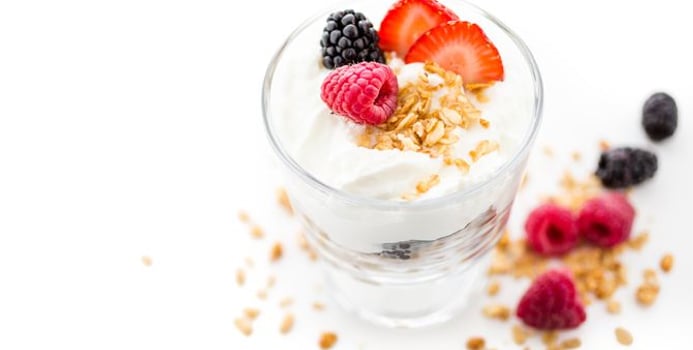If you're looking for a healthier and tastier alternative to that popular ice cream dessert, then it's time you switch to frozen yogurt. It basically gives you that same chill-induced satisfaction associated with ice cream without feeling the guilt of sacrificing that nutritious diet of yours. Speaking of being nutritious, this inimitable icy delight packs quite a wallop when it comes to the nutrition department.
Basic Ingredients
Frozen yogurt is essentially made up of milk fat, milk solids, yogurt culture, sweeteners, emulsifiers and stabilizers, corn syrup, and coloring and flavoring agents. The presence of milk fat or buttermilk is minimal, ranging from 0.5 to 6% that is found in yogurt--compared to regular ice cream, which contains at least 10% due to the cream. The bulk of the frozen yogurt is made up of milk solids that give it a sweet and smooth composition. Meanwhile, the yogurt culture provides essential probiotics, bacteria that is healthful for humans, such as lactobacillus acidophilus and bifidobacterium. The use of natural sweeteners, such as beet or cane sugar, and corn syrup further enhance the sweetness to a much standard level. In order to bring the frozen yogurt to an appropriate consistency, animal and vegetable gelatins act as emulsifying and stabilizing agents. Food colors and flavors provide the distinct character for variation and appeal.
Nutritional Content and Value
Fitting the bill as a healthy alternative, frozen yogurt is loaded with a sundry of organic compounds that are necessary and beneficial to the body. The first one that comes to mind is the essential nutrient known as calcium. It is readily available because of its rich occurrence in dairy products. This essential mineral's greatest benefit is that it significantly develops bone strength and density, and at the same time, mitigates the chances of calcium deficiency-related illnesses. Frozen yogurt also has probiotics, in the form of Lactobacillus acidophilus and Bifidobacterium. The presence of these probiotics is another big plus because it has a wide range of potential benefits. Some examples of these are improvement of digestion, enhancement of immunity against certain diseases, and production of vitamins inside the body.
Another essential nutrient that can be obtained from eating frozen yogurt is protein. It serves as the body's builder and repairer of tissues, and also a reliable producer of hormones, enzymes, and a host of other bodily chemicals. Though not considered to be essential nutrients, there are also carbohydrates present, which provide that additional energy boost to the body. There is also an assortment of other notable vitamins and minerals that can be found in frozen yogurt that add on more benefits. Potassium, for instance, helps in the proper blood pressure regulation, while thiamine assists in the proper nervous system operation, and riboflavin facilitates in the task of breaking down fats, proteins and carbohydrates.
Consequently, after finding out the potentials that frozen yogurt offers, you should be able to realize that not only are you given the privilege of enjoying a cool and delectable respite, but also a serving of essential nutrients for your greater well-being.



